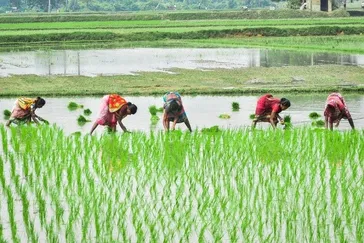IER News & blogs
Employment entry and exit by women in India - blog by Soham Sahoo* and Sudipa Sarkar
 While India’s low female labour force participation has been studied extensively in the recent literature, an aspect that has received insufficient attention is the dynamic nature of employment – that is, individuals enter and exit the workforce at various points in time.
While India’s low female labour force participation has been studied extensively in the recent literature, an aspect that has received insufficient attention is the dynamic nature of employment – that is, individuals enter and exit the workforce at various points in time.
Analysing India Human Development Survey data from 2004-05 and 2011-12, this article shows that women have lower entry rates and higher exit rates vis-à-vis men, both in the short and long term. Read more in this blog, published in Ideas for India, here.
* Soham Sahoo, Assistant Professor, Indian Institute of Management Bangalore
Social Identity and Aspiration – Double Jeopardy or Intersectionality? Evidence from Rural India

This discussion paper, written by Sudipa Sarkar, Bhaskar Chakravorty and Clare Lyonette, analyses primary survey data from participants of a large-scale skill-training programme that targets rural poor youths in India.
Focusing on two dimensions of individuals' identity: caste and gender, the empirical findings suggest that training participants from the most socially disadvantaged groups - Scheduled Tribe (ST) and Scheduled Caste (SC) - have significantly lower income aspiration when compared to Other Backward Class (OBC) and Other Caste (OC) participants. Female participants also have significantly lower aspiration than their male counterparts.
The aspiration gaps exist even after controlling for various background characteristics, including participants' pre-training personality traits and soft skills. Individual-level and household-level factors mediate some of the aspiration gaps based on caste and gender.
The paper finds evidence that for SC/ST female participants, the disadvantages on both caste and gender dimensions add up; this is reflected in their lower income aspiration levels, in comparison with all other groups. Thus, the results support the hypothesis of "double jeopardy" instead of "intersectionality" in this context.
This is the first paper of an ongoing project funded through the Global Challenges Research Fund (GCRF).
Covid-19 lockdown and migrant workers: Survey of vocational trainees from Bihar and Jharkhand - Blog by Bhaskar Chakravorty and colleagues
 The nationwide lockdown in India hit migrant workers particularly hard and once travel restrictions were lifted, 11 million interstate migrants returned home. In this blog, Bhaskar Chakravorty, IER PhD student, and colleagues, present key findings from a telephone survey of young people from Bihar and Jharkhand who were trainees of a large skill-based training programme, titled ‘Deen Dayal Upadhyay Grameen Kaushalya Yojana’ (DDU-GKY) in India. It places disadvantaged rural youth into formal salaried jobs in manufacturing and services, often in urban areas in other states. The survey findings focus on the impact of the lockdown on interstate migrant workers and their willingness to migrate again in the future. Read more here.
The nationwide lockdown in India hit migrant workers particularly hard and once travel restrictions were lifted, 11 million interstate migrants returned home. In this blog, Bhaskar Chakravorty, IER PhD student, and colleagues, present key findings from a telephone survey of young people from Bihar and Jharkhand who were trainees of a large skill-based training programme, titled ‘Deen Dayal Upadhyay Grameen Kaushalya Yojana’ (DDU-GKY) in India. It places disadvantaged rural youth into formal salaried jobs in manufacturing and services, often in urban areas in other states. The survey findings focus on the impact of the lockdown on interstate migrant workers and their willingness to migrate again in the future. Read more here.
Online research methods workshop delivered as part of an ESRC project
 As part of the ESRC Global Challenges Research Funded project ‘Inequalities and skills acquisition in young people’, the IER research team has designed and delivered research methods training to students working towards a Post Graduate Diploma in (Rural) Management at the Xavier Institute of Social Service (XISS) in Ranchi, India.
As part of the ESRC Global Challenges Research Funded project ‘Inequalities and skills acquisition in young people’, the IER research team has designed and delivered research methods training to students working towards a Post Graduate Diploma in (Rural) Management at the Xavier Institute of Social Service (XISS) in Ranchi, India.
The three online workshops took place on 17-18th August with more than 50 students participating.
As a follow-up to the training sessions students are invited to enrol on a University of Warwick Moodle, where they can access relevant resources and work on a group assignment to practise what they have learnt in the workshops.
What is the future of youth skill-building in developing countries in the post Covid-19 era? Blog by Dr Sudipa Sarkar and Bhaskar Chakravorty
 Unemployment and scarcity of jobs have long been important concerns for policymakers in developing countries (World Bank, 2012). These issues are crucial for India as the country is home to the world’s largest population of young people ready to participate in the labour force (UNFPA report, 2019). The current situation caused by the Covid-19 outbreak and the subsequent countrywide lockdown is certain to affect employment levels in the country, especially as India has a large informal economy, which is currently bearing the major brunt of the lockdown. In this context, targeted Active Labour Market Policies (ALMPs), which have been historically used to cushion the economic shock of such global crises in developing countries, can play an important role (Cazes, Heuer, & Verick, 2011; Imbert and Papp, 2015; World Bank, 2012).
Unemployment and scarcity of jobs have long been important concerns for policymakers in developing countries (World Bank, 2012). These issues are crucial for India as the country is home to the world’s largest population of young people ready to participate in the labour force (UNFPA report, 2019). The current situation caused by the Covid-19 outbreak and the subsequent countrywide lockdown is certain to affect employment levels in the country, especially as India has a large informal economy, which is currently bearing the major brunt of the lockdown. In this context, targeted Active Labour Market Policies (ALMPs), which have been historically used to cushion the economic shock of such global crises in developing countries, can play an important role (Cazes, Heuer, & Verick, 2011; Imbert and Papp, 2015; World Bank, 2012).
